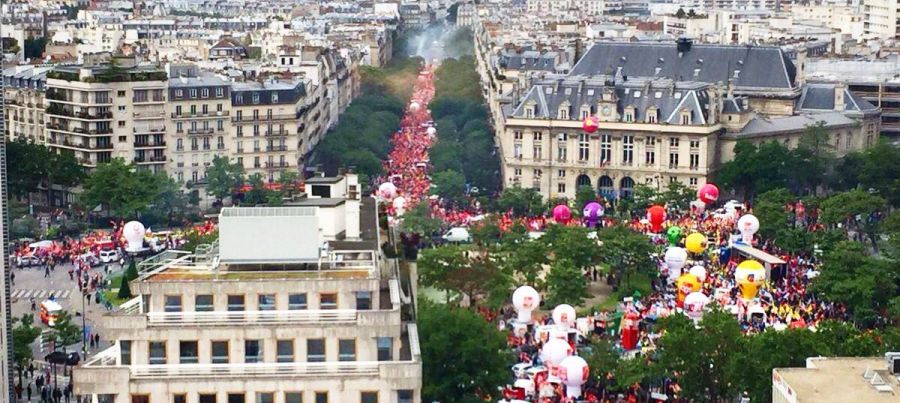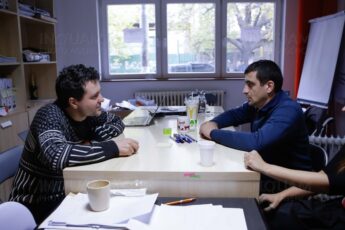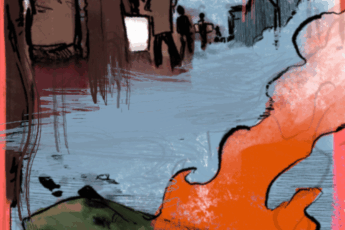
Report of the Paris Assembly – 11th June 2016
Participants
Coordination des intermittents et précaires (France), NuitDebout (Commission general strike, Commission political economy, Commission democracy), Sud Solidaire (France), Clap (Rome, Italy), Precarious Dis-connections (Bologna, Italy), Plan C (UK), Alt åt Alla (Sweden), Worker’s Initiative (Poland), Interventionistische Linke (Germany), activists from Scotland, Netherlands and Brazil.
Discussion
From France to Europe
A report of the ongoing mobilization was made by the French comrades, starting from the necessity of going from France to Europe, that is of expressing the transnational potential of the French movement, also concerning its experimental character in terms of connection between social movements and trade unions. The commission for the general strike has been active in the past months in turning the democratic aspirations of NuitDebout into struggles on the field of strike and labor, that is also finding connections with unions and workers’ protests outside the square. The difficulty, felt on a national basis and even more on a European level, is how to build a «we», in a situation where no ideological basis is shared. The commission for political economy underlined the need of stressing the commonalities among the countries in Europe in terms of attack on labor and social rights. The CIP (Coordination des intermittents et précaires) stressed how the mobilization against the loi travail has been able to make different struggles converge, while the strategy of the government has been that of producing divisions among sectors and categories, improving the conditions of some workers at the price of the others. It has also been stressed that beside the loi travail, the transformation of welfare systems (such as the reform of unemployment benefits) and the management of migrants’ movement were some of the main instruments to cause divisions among workers and to increase the control over the labor force. In this frame, the necessity of overcoming national borders and the division among categories and professions is crucial, as well as the necessity of going beyond the simple organization of labor through unions.
Striking in precarious times: what do we have in common?
The loi travail is very similar to other laws enforced in Europe in the last years. Even though in each country there are specific ways of institutionalizing precarity, there is also a common trend in Europe that should become the starting point of our initiative. This makes a change of perspective necessary, first of all for all of us who have been mainly engaged in organizing on a national or local level. This is true especially for the unions that are usually stuck on the national context and on the organization of labor into categories, which has been substantially overcome by the growth of mobility and precarity.The struggle for the defense of national bargaining is telling of this predicament. While it can gain important results on the national level, what do we do against the fact that, for instance, a good collective bargaining in France can mean a decrease in wages and working conditions in Poland or elsewhere along the production chain, in order to make the book balance?
The challenges of striking in precarious labor conditions are many: each person changes many jobs through his or her life, not only inside one category but very often changing sectors and kind of jobs. Beside this mobility from one work to another, there is an increased mobility in space: more and more migrants are looking for better conditions inside the European space. On the one hand, this brings about an increased fragmentation: inside a workplace many different and temporary conditions coexist. On the other hand, one can see that, in this overcoming of sectors and professions, in the education, in the constructions, in logistics as in the spectacle, labor is becoming more abstract, which means that the particular conditions of workers are generally turned into a complete availability to labor. Beside this, while what we see is fragmentation and differences, it is clear that in the transnational chains of production and reproduction there is a coordination, that relies on these differences to make more profits. The problem of finding commonalities is also a matter of imagination: how do we name this new condition, effective at the same time as a set of differences and as an homogeneization of labor? How do we offer an accountable narrative in which precarious, migrants and industrial workers can recognize themselves? How can the Transnational social strike platform become the general frame in which the different experiences of insubordination and refusal of exploitation can find a common point of reference?
One way of producing this identification and convergence is to endorse some common claims, such as the European minimum wage, the European basic income and welfare, the European residence permit without conditions. This would allow us also to address the political conditions that produce and help generalizing precarity: the welfare system is used in many countries lately to produce a total availability to work, no matter how bad the conditions are; the system of social contribution is becoming a financial system which allows the production of profits while bounds workers to their condition of precarity; likewise the provisional nature of the residence permits for migrants puts them in a particularly precarious position in the job market. The claims should be understood as tools to be used to produce communication among sectors and places, making the different conditions converge around some common key issues.
Outcomes
Towards the October meeting
The Paris assembly has been a first moment of confrontation looking towards a bigger two days meeting in Paris in October. This meeting is meant as a step forward in terms of involvement and construction of common priorities and practices. It is also understood as a meeting place for several subjects who are actually trying to organize themselves on a transnational level: a meeting among Amazon workers from Poland, Germany and France is already expected.
Some ideas on the axis around which to build the meeting were put on the table:
- Common claims/common European program. It was underlined that the discussion on the claims should not be separated from the discussion on the working situations. Being understood as «tools», both for organizing and against the isolation of workers produced by governments and employers, the claims should be first of all «used» as instrument to involve and organize workers, more than simply be «asked» to some institution.
- Transnational chains – not only of production but also of reproduction. Which other situations a part from Amazon, also beyond the logistics sector, can we involve? Eg. junior doctors in the UK, the workers of the health services who struggled in Sweden, the workers of migrants’ «welcome centers» who are organizing in Italy.
- New practices and forms of strike.
The priority is at the moment that each group thinks locally 1) at how to engage in the involvement of new collectives, workers and unions for the meeting; 2) proposals for topics/axis of the meeting in itself.
Provided that we cannot at the moment launch an initiative for the autumn, we nevertheless think it is important to make a practical step towards a transnationalization of our struggles by proposing and discussing a common European initiative. This should be intended not just as a step forward in comparison to the 1st of March, but also a practical opportunity to enlarge the movement we see in France in terms of transnational coordination, connections with strikes and convergence with other struggles in Europe.
Final document
As an outcome of the assembly and as proposed by the Commission political economy, we will write together with the French comrades a document underlining the need of expressing the transnational potential of the French mobilization. While it is true that we don’t know how the French movement against the loi travail will continue, the better way to seize the day seems to think at how to go on and how to build paths of struggles that last, beyond the approval or refusal of the loi travail in itself. In this perspective, the document is understood also as a launch of the October meeting. A group of the participants to the assembly will draft the document and share it with the coordination mailing list. It will be the finalized in a Skype call, where we need to decide also the date of the meeting in itself.





